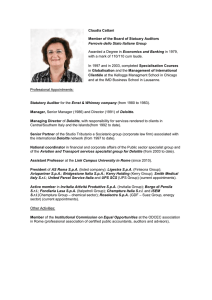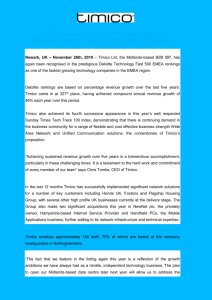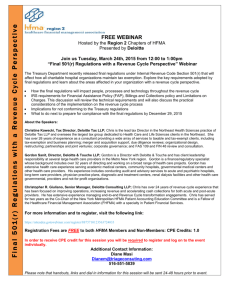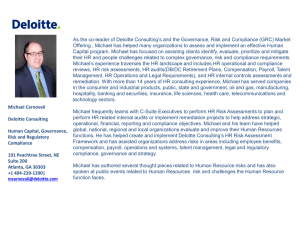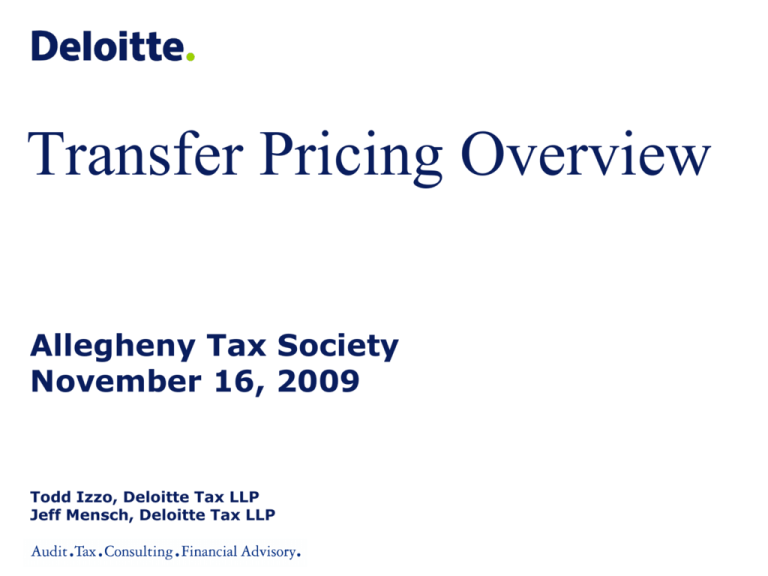
Transfer Pricing Overview
Allegheny Tax Society
November 16, 2009
Todd Izzo, Deloitte Tax LLP
Jeff Mensch, Deloitte Tax LLP
Agenda
The Arm’s Length Standard
Transfer Pricing Methods
Managing Transfer Pricing Risk
Overview of Administration’s International
Tax Proposals
Copyright © 2008 Deloitte Development LLC. All rights reserved.
1
Tax Learning & Performance Enhancement. Revised 3/08.
The Arm’s Length
Standard
Copyright © 2008 Deloitte Development LLC. All rights reserved.
Tax Learning & Performance Enhancement. Revised 3/08.
Transfer Pricing -- Overview
• Refers to a body of law designed to prevent
the shifting of income between taxing
jurisdictions
• It is a multi-disciplinary approach to
determine whether cross-border transactions
between related parties comply with
established guidelines.
• Most tax authorities require taxpayers to
comply with the “Arm’s Length Principle.”
• An integral part of an effective Global Tax
and Treasury Strategy
Copyright © 2008 Deloitte Development LLC. All rights reserved.
3
Tax Learning & Performance Enhancement. Revised 3/08.
Escalation of foreign rules and
enforcement
1995
Australia
South Africa
USA
1996 -1998
China
Slovakia
Brazil
Japan
Italy
New Zealand
Mexico
Korea
France
Australia
South Africa
USA
1999 -2000
Germany
Russia
Belgium
Venezuela
Argentina
Canada
UK
China
Slovakia
Brazil
Japan
Italy
New Zealand
Mexico
Korea
France
Australia
South Africa
USA
Copyright © 2008 Deloitte Development LLC. All rights reserved.
2001 -2002
Thailand
Portugal
Peru
India
Netherlands
Germany
Russia
Belgium
Venezuela
Argentina
Canada
UK
China
Slovakia
Brazil
Japan
Italy
New Zealand
Mexico
Korea
France
Australia
South Africa
USA
4
2003 -2004
Taiwan
Hungary
Colombia
Malaysia
Thailand
Portugal
Peru
India
Netherlands
Germany
Russia
Belgium
Venezuela
Argentina
Canada
UK
China
Slovakia
Brazil
Japan
Italy
New Zealand
Mexico
Korea
France
Australia
South Africa
USA
2005 -2009
Uruguay
Finland
Turkey
Vietnam
Singapore
Poland
Norway
Kazakhstan
Indonesia
Ecuador
Denmark
Taiwan
Hungary
Colombia
Malaysia
Thailand
Portugal
Peru
India
Netherlands
Germany
Russia
Belgium
Venezuela
Argentina
Canada
UK
China
Slovakia
Brazil
Japan
Italy
New Zealand
Mexico
Korea
France
Australia
South Africa
USA
Tax Learning & Performance Enhancement. Revised 3/08.
1
Transfer Pricing in the Headlines
• Glaxo Smith-Kline - $3.4 billion
• Symantec/Veritas - $1 billion
• Motorola - $800 million
• Fiji Water - $3 million per day in export
losses
• Google – recognizes tax benefit of $90
million due to successful APA
• Wal-Mart – share prices climb upon
announcement of bilateral APA with China
5
Copyright © 2008 Deloitte Development LLC. All rights reserved.
5
Tax Learning & Performance Enhancement. Revised 3/08.
Current Environment: The Past is no Guide
• Increased enforcement of transfer pricing
regulations by U.S. and foreign tax authorities
• Recognition that transfer pricing permeates the
financial statements of many taxpayers
• Emphasis on tying provision amounts to individual
transfer pricing “red flags”
• More intense (sometimes contentious) discussions
with auditors
6
Copyright © 2008 Deloitte Development LLC. All rights reserved.
6
Tax Learning & Performance Enhancement. Revised 3/08.
Regulatory Background
• Sec. 482 and regulations
• Sec 367(d) and regulations
• Sec. 6662
• OECD Guidelines
• Foreign Law / Regulations
• 482 vs. OECD Guidelines
7
Copyright © 2008 Deloitte Development LLC. All rights reserved.
7
Tax Learning & Performance Enhancement. Revised 3/08.
Definition of Related Parties
•Direct or indirect participation in:
–Management,
–Control or
–Capital
•By one entity in another;
•By one entity or group of entities in
both.
Copyright © 2008 Deloitte Development LLC. All rights reserved.
Tax Learning & Performance Enhancement. Revised 3/08.
Control
•Related Parties
•A corporation and a controlling person
•Any two corporations:
– Controlled by the same or related persons
– Related directly or indirectly to the same third
corporation/party
•Unrelated Parties
•Questions of Fact
• Common mind
• Acting in concert
• De Facto control
Copyright © 2008 Deloitte Development LLC. All rights reserved.
Tax Learning & Performance Enhancement. Revised 3/08.
Arm’s Length Standard
MARKET
Intercompany
Sale
+
Multinational
Manufacturing
Group
Distribution
10
Copyright © 2008 Deloitte Development LLC. All rights reserved.
10
Tax Learning & Performance Enhancement. Revised 3/08.
Arm’s Length Standard
• The Tax Administrator’s “Market Creation” Problem is “solved”
by use of the arm’s length standard
• Wording from IRS 1994 regulations:
– ...the standard to be applied in every case is that of a
taxpayer dealing at arm’s length with an uncontrolled
taxpayer.
– A controlled transaction meets the arm’s length standard if
the results of the transaction are consistent with the results
that would have been realized [by] uncontrolled taxpayers…
11
Copyright © 2008 Deloitte Development LLC. All rights reserved.
11
Tax Learning & Performance Enhancement. Revised 3/08.
Arm’s Length Standard
• An adjustment under Code §482 is applicable if
transfer price charged is not “arm’s length.”
• The regulations authorize the IRS to adjust a
taxpayer's income in any way necessary to conform
to the arm’s length standard.
• Adjustments under Code §482 directly affect a
taxpayer's U.S. taxable income and resulting U.S.
federal income tax liability.
Bad motive is not a prerequisite for an adjustment.
Copyright © 2008 Deloitte Development LLC. All rights reserved.
12
Tax Learning & Performance Enhancement. Revised 3/08.
Profits Relate to Functions and Risks
Each activity or enterprise receives a share of total profits that reflects
the contribution of that activity or enterprise to earning those profits.
Distributor profit
Trademark &
technology intangibles
Base toll
manufacturing fee
Service fee
Return for assuming
operating cost risk
Market power
Return for assuming
long-term volume risk
Return for assuming
inventory price risk
Inventory carrying
cost
Sourcing fee
Copyright © 2008 Deloitte Development LLC. All rights reserved.
Process know-how
Location savings
Tax Learning & Performance Enhancement. Revised 3/08.
Transfer Pricing
Methods
Copyright © 2008 Deloitte Development LLC. All rights reserved.
Tax Learning & Performance Enhancement. Revised 3/08.
Best Method Rule
• U.S. Rules require taxpayers to apply the
“Best Method”
• There are four important factors in selecting
the Best Method:
– The degree of comparability between the
controlled transactions and uncontrolled
comparables
– The quality and quantity of data
– Assumptions used in the analysis
– Sensitivity of results to data deficiencies
Copyright © 2008 Deloitte Development LLC. All rights reserved.
15
Tax Learning & Performance Enhancement. Revised 3/08.
U.S. & OECD: Points of Contention
• OECD - professed dislike of CPM, possibly in
deference to the low regard of some
European and Asian members for it
• OECD - preference for transactions-based
evidence, even if the evidence is not highly
comparable to the tested transactions
• OECD - considers operating profit-based
methods to be a last resort
• Note that, as practically applied, there is little
difference between the TNMM and the CPM
Copyright © 2008 Deloitte Development LLC. All rights reserved.
16
Tax Learning & Performance Enhancement. Revised 3/08.
Classifying Transactions
• Tangible property
• Intangible property
• Services
• Loans
• Mixed Transactions
Copyright © 2008 Deloitte Development LLC. All rights reserved.
17
Tax Learning & Performance Enhancement. Revised 3/08.
Transfer Pricing Methods
Unit of
measurement
Tangible
Intangible
Services
OECD
Guidelines
Price
CUP
CUT
CUSP
CUP
Gross Profit on
Sales
Resale
margin
method
N/A
Gross services
margin method
Resale margin
method
Gross Profit on
Costs
Cost plus
method
N/A
Cost of services
plus method
Cost plus
method
Net Profit of
One Party
CPM
CPM
CPM
TNMM
Net Profit of
Both Parties
Profit Split
Profit Split
Profit Split
Profit Split
Other
Unspecified
Unspecified
SCM /
Unspecified
Unspecified
18
Copyright © 2008 Deloitte Development LLC. All rights reserved.
18
Tax Learning & Performance Enhancement. Revised 3/08.
OECD vs. 482 – Tangible Goods
• U.S. Regulations abandon hierarchy of methods in
favor of best method rule
• Under U.S. best method rule, no preference for
transactional methods over profit-based methods
and no recognition of inherent limits of profitbased methods
• In audits, IRS uses CPM whenever possible
• CPM also heavily used by taxpayers in preparing
documentation
• CPM not a recognized methodology under the
OECD Guidelines, though practically often
equivalent to TNMM
Copyright © 2008 Deloitte Development LLC. All rights reserved.
19
Tax Learning & Performance Enhancement. Revised 3/08.
OECD vs. 482 - Intangibles
•U.S. rules require that payment for the
acquisition or use of intangible property be
“commensurate with the income to be
earned from the use of the property”
•Under U.S. rules, legal ownership of
intangibles matters
•IRS Cost Sharing Regs
Copyright © 2008 Deloitte Development LLC. All rights reserved.
20
Tax Learning & Performance Enhancement. Revised 3/08.
OECD vs. 482 – Finance and Services
• OECD preference against safe harbors
• IRS makes extensive use of mechanical rules
and safe harbors in these areas, e.g.:
– Mathematical formula for computing permissible
number of interest-free days on intercompany
trade receivables
– Safe harbor rates on dollar-denominated loans
– Covered Services (Rev. Proc. 2007-13)
– IRS requirement to include stock option expenses
in cost base of some methods for charging out
services
Copyright © 2008 Deloitte Development LLC. All rights reserved.
21
Tax Learning & Performance Enhancement. Revised 3/08.
Managing Transfer
Pricing Risk
U.S. Transfer Pricing Penalties
• Treas. Reg. §1.6662-6 provides for penalties of either 20 or 40
percent.
• The 20 percent penalty applies if:
– 200 percent or more (or 50 percent or less) of the price
reported on the annual tax return; or
– All transfer pricing adjustments are greater than the lesser of
US$ 5,000,000 or 10% of gross receipts.
• The 40 percent penalty applies if:
– 400 percent or more (or 25 percent or less) of the price
reported on the annual tax return; or
– All transfer pricing adjustments total an amount greater than
the lesser of US$ 10,000,000 or 20% of gross receipts.
Copyright © 2008 Deloitte Development LLC. All rights reserved.
23
Tax Learning & Performance Enhancement. Revised 3/08.
Documentation Requirements
• Penalties may not apply if maintain sufficient
contemporaneous documentation.
• The documentation must include the following:
1.
2.
3.
Overview of the taxpayer’s business;
Organizational structure;
Any documentation explicitly required for the application of a
specific transfer pricing regulations;
4. Selection of transfer pricing method
5. Application/Rejection of alternative transfer pricing methods;
6. Controlled transactions / Internal data
7. Description of comparables
8. Economic Analysis;
9. Relevant data obtained after the tax year; and
10. Index of principal and background documents.
Copyright © 2008 Deloitte Development LLC. All rights reserved.
24
Tax Learning & Performance Enhancement. Revised 3/08.
Risk Management Considerations
• Integration of tax and business planning and objectives
– Coordination of risk management & effective tax rate
• Centralization of transfer pricing decision-making
– Global documentation/penalty issues: consistency
• Global planning, but focused risk management
– Make effort appropriate to what’s at stake
• Defensible economics
– Economic substance and procedural requirements
• Risk tolerance
– Litigation averse?
Copyright © 2008 Deloitte Development LLC. All rights reserved.
25
Tax Learning & Performance Enhancement. Revised 3/08.
Application of Risk Management Principles
• Determine issues and countries with greatest
potential exposure
– Level of activity
– Complex, difficult issues
– “Unusual” results
– Exit tax issues
– Aggressive tax authority
Copyright © 2008 Deloitte Development LLC. All rights reserved.
26
Tax Learning & Performance Enhancement. Revised 3/08.
Top 10 toughest tax authorities for transfer
pricing risk*
1.
2.
3.
4.
5.
Japan
Germany
US
Australia
France
6. India
7. Korea
8. China
9. Canada
10. UK
* TP Week, global survey of tax directors and TP advisors, December
2007.
Copyright © 2008 Deloitte Development LLC. All rights reserved.
27
Tax Learning & Performance Enhancement. Revised 3/08.
Determine whether to address highest-risk issues
proactively or defensively
• Proactive Strategies
– Amended returns or otherwise notify tax authority
– Change policy or practice
– Advance Pricing Agreement (“APA”)
• Defensive Strategies
– Document internal decision-making
– Transfer pricing (§6662) studies by third party
– Backup support
• Protect institutional memory
Copyright © 2008 Deloitte Development LLC. All rights reserved.
28
Tax Learning & Performance Enhancement. Revised 3/08.
After Implementation, It’s All About
Maintenance
• Establish solid transfer pricing policy
(set rules on intercompany transactions)
– Modify transaction flow/scheme of tangible assets
– Review intercompany policy on intangible assets
– Assess allocation of head office expenses and other
intercompany service charges
– Imbed TP policy in financial systems
– Consider where decisions are made, economic substance
• Conduct periodic assessment of possible TP risks,
and consider countermeasures
• Respond to each country’s documentation rules
(prepare TP studies for documentation purposes)
• Take advantage of APA process
Copyright © 2008 Deloitte Development LLC. All rights reserved.
29
Tax Learning & Performance Enhancement. Revised 3/08.
Overview of
President Obama’s
International Tax
Proposals
Copyright © 2008 Deloitte Development LLC. All rights reserved.
Tax Learning & Performance Enhancement. Revised 3/08.
JCT Report
On September 14, 2009, JCT released their explanation of the
international proposals in the Administration’s FY2010 Budget.
On September 8th and 9th, the Administration released their explanations related to
the individual income tax, estate and gift tax, and business tax proposals.
JCT’s explanation of the Administration’s Budget is intended to aid
members of Congress in their consideration of the Administration’s
proposals.
JCT is a non-partisan committee with staff economists and tax lawyers that serves
members of Congress in its consideration of tax legislation. It is not a policy making
body.
In that role, JCT provides Congress with explanations of tax related budget
proposals, the policy pros and cons of budget proposals, and comparisons of an
administration’s proposals with other proposals to address a particular issue.
Copyright © 2008 Deloitte Development LLC. All rights reserved.
Tax Learning & Performance Enhancement. Revised 3/08.
Overview of Revenue Estimates
• On August 25, 2009, OMB released a mid-session review of the
budget for Fiscal Year 2010 with revised revenue estimates of the
Administration’s international tax proposals.
White House
5/2009 Projection
JCT 6/2009 Projection
White House
8/2009 Projection
Reform check-the-box rules for foreign entities
86.5
31.1
36.5
Defer certain U.S. income tax deductions
60.1
51.5
52.9
Foreign tax credit reform: single pool of §902
credits
24.5
45.6
24.5
Foreign tax credit reform: matching foreign
income and taxes
18.5
10.2
18.4
Foreign tax credit reform: dual capacity
taxpayers
4.5
7.2
4.9
Definition of “intangible property” for §367(d)
and §482 purposes
2.9
1.0
1.0
Repatriation of earnings in certain cross-border
reorganizations
0.3
0.4
0.3
Repeal of 80/20 Company Rules
1.2
0.8
1.3
Earnings stripping
1.2
1.5
1.2
Prevent avoidance of dividend withholding
taxes in equity swaps, securities loans, repos
1.4
1.2
1.2
Enforcement proposals (effective beginning
after Dec 31 of year of enactment)
8.7
8.8
8.7
209.8
159.3
150.9
Total for all international proposals
Copyright © 2008 Deloitte Development LLC. All rights reserved.
Tax Learning & Performance Enhancement. Revised 3/08.
Key Potential Legislative Changes
Proposal
Application
Practical Effects
Expiration of
§954(c)(6)
Look through treatment on certain Restricts efficient cross border
financing and licensing
payments between related CFCs
transactions
may no longer be available
Deferral of U.S.
Income Tax
Deductions
Foreign related deductions of U.S.
person (e.g., interest expense)
deferred unless foreign source
income is taxed currently
Increases the cost of capital
Increases cost of performing
SG&A in the United States
Encourages movement of jobs
offshore
Single E&P and
Tax Pool (for
purposes of
repatriation)
Deemed paid foreign tax credit
computed based on a pro rata
share of all foreign taxes of all
foreign subsidiaries multiplied by
the ratio of distributed foreign E&P
to total E&P of all subsidiaries
qualifying for the deemed paid
credit
Copyright © 2008 Deloitte Development LLC. All rights reserved.
JCT Recommendations
And Comments
The look-through rule can
encourage indefinite deferral of
U.S. tax on foreign income
through continued
reinvestment of foreign
earnings. It may also affect the
timing and utilization of foreign
tax credits by facilitating the
separation of high and low tax
foreign source income.
JCT noted that absent Section
864(f), the proposal would
overcorrect for the “timing
mismatch” between the U.S.
deduction of interest expense
and the taxation of foreign
earnings such borrowing
supports.
Increases the cost of
repatriating earnings to the
United States
JCT provides additional details
regarding proposal ‘s scope,
including that proposal applies
to pre-effective date E&P and
Incentive for companies to retain
taxes of foreign subsidiaries.
more earnings abroad
JCT raises questions regarding
the separation of high and low
tax pools through the use of
branches and lower than sixth
tier subsidiaries.
Tax Learning & Performance Enhancement. Revised 3/08.
Key Potential Legislative Changes
Proposal
Application
Classification of
Foreign Entities
Foreign eligible entities with a
single member treated as
corporations for U.S. tax purposes,
unless: (1) entity and the single
member are created or organized
in, or under the laws of, the same
foreign country; or (2) disregarded
entity is a first-tier entity wholly
owned by a U.S. person, except in
the case of “U.S. tax avoidance”
Practical Effects
Restricts efficient cross border
financing transactions
Increases foreign tax imposed
on U.S. multinationals
JCT Recommendations
And Comments
JCT suggests that Congress
may consider the treatment of
other hybrid entities, such as
U.S. LLCs, DRCs and entities
with tax residence outside of
their country of organization
Repeal of 80 /
20 Companies
Full repeal of 80/20 Companies
JCT suggests using a more
targeted approach rather than
full repeal.
Modification to
section 356
Restricts tax efficient
Repeal of boot within gain
limitation for purposes determining repatriation
the income included following an
asset reorganization
JCT suggests clarification is
needed; for example what is
the source of accumulated E&P
from which the deemed
dividend is generated (i.e.,
E&P of both the transferor and
transferee, or only the
transferor).
Copyright © 2008 Deloitte Development LLC. All rights reserved.
Tax Learning & Performance Enhancement. Revised 3/08.
Classification of Foreign Entities
Provision
Classification of Foreign Entities
Revenue Raised
$36.5 billion
•
Foreign eligible entities with a single member treated as
corporations for U.S. tax purposes, except:
– entity and the single member are created or organized in, or
under the laws of, the same foreign country; or
– disregarded entity (“DRE”) is a first-tier entity wholly owned
by a U.S. person, except in the case of “U.S. tax avoidance”
•
•
Restricts efficient cross border transactions
Increases foreign tax imposed on U.S. multinationals
•
Conversion from DRE classification would be determined under
current Treasury regulations and tax principles resulting in
springing transactions – springing debt, 304 deemed dividends,
deemed asset sales
No definition provided for “U.S. tax avoidance” for U.S.-owned
DREs
Application
Practical Effects
Significant Issues /
Observations
•
Copyright © 2008 Deloitte Development LLC. All rights reserved.
35
Tax Learning & Performance Enhancement. Revised 3/08.
Foreign Tax Credit Reforms
Provision
Single Pool of Section 902 Credits
Revenue Raised
$24.5 billion
•
Deemed paid foreign tax credit computed based on a pro rata
share of all foreign taxes of all foreign subsidiaries multiplied by
the ratio of distributed foreign E&P to total E&P of all subsidiaries
qualifying for the deemed paid credit
•
Increases the cost of repatriating earnings to the United States
•
Incentive for companies to retain more earnings abroad
•
Potential incentive for the use of highly taxed branches
•
Foreign subsidiary E&P includes all companies qualifying for the
§902 deemed paid credit (i.e., includes 10/50 companies)
•
§901 credits would still be determined under current rules
•
How to spring deferred 902 credits versus utilizing 904 credit
carryforwards?
•
High-tax exception determined on an entity by entity basis for
Subpart F?
Application
Practical Effects
Significant Issues /
Observations
Copyright © 2008 Deloitte Development LLC. All rights reserved.
36
Tax Learning & Performance Enhancement. Revised 3/08.
Deferral of Certain U.S. Tax Deductions
Provision
Deferral of Certain U.S. Tax Deductions
Revenue Raised
$52.9 billion
Application
• Expenses allocated and apportioned to foreign source income
deferred to the extent the foreign source income associated with
the expenses is not currently subject to U.S. taxation.
• R&E expenses not subject to deferral
• Deferred deductions carried forward and not lost
• Increases the cost of capital
Practical Effects
• Increases cost of performing SG&A in the United States
• Treatment of first-tier foreign branches/hybrid branches/export
transactions?
Significant Issues /
Observations
• Foreign source income not currently subject to taxation includes all
10/50 companies and CFCs.
• Repeal of worldwide interest allocation rules (§864(f))?
• How are historical OFLs treated?
Copyright © 2008 Deloitte Development LLC. All rights reserved.
37
Tax Learning & Performance Enhancement. Revised 3/08.
Todd A. Izzo
• Partner, International Tax - Pittsburgh Office – Deloitte Tax LLP
– Experience: Todd specializes in international taxation, with a focus on global tax
optimization, financial products and instruments, international mergers, acquisitions,
reorganizations, tax treaties, foreign tax credit planning and other areas of U.S.
corporate and international taxation. Prior to joining Deloitte & Touche in 2000, Todd
worked in the area of international and corporate tax for five years in the Washington,
D.C. office of Dewey Ballantine and served as a law clerk for one year in the chambers
of Judge Ed Becker of the U.S. Third Circuit Court of Appeals.
– Education: Todd received a B.S. degree with highest distinction in accounting from
Penn State University, a J.D. degree summa cum laude from the University of
Pennsylvania Law School and an LL.M. in taxation summa cum laude from Georgetown
University Law Center. Todd was awarded the May 1991 Alexander E. Loeb Gold
Metal award for the high score in Pennsylvania on the CPA exam and the Elijah Watt
Sells Award for one of the top scores in the U.S.
– Professional and Civic Affiliations: Pennsylvania and District of Columbia Bars;
American Institute of Certified Public Accountants; Pennsylvania Institute of Certified
Public Accountants; American Bar Association (Tax Division); Penn State Alumni
Association; Pittsburgh Tax Club; Allegheny Tax Society.
• Office: (412) 338-7606
• E-mail: tizzo@deloitte.com
Copyright © 2008 Deloitte Development LLC. All rights reserved.
Tax Learning & Performance Enhancement. Revised 3/08.
Jeffrey J. Mensch
• Senior Manager, International Tax - Pittsburgh Office – Deloitte Tax LLP
– Experience: Jeff specializes in international tax and transfer pricing, with a
focus on global tax and treasury optimization through the coordination of
legal and financing structures with the pricing of intercompany flows. Jeff
has extensive experience assisting taxpayers to design, implement and
execute structures within operational and treasury constraints that facilitate
tax-efficient financing, intellectual property development and supply chain
optimization. Jeff began his career working for six years in the Transfer
Pricing group of Deloitte’s National Tax practice in Washington, D.C. Since
2001, he has been a member of the International Tax group in Deloitte’s
Pittsburgh office.
– Education: Jeff received a B.S. in Economics with a concentration in
Finance and Marketing from the University of Pennsylvania’s Wharton
School of Business. He also has received his J.D. degree cum laude from
the Georgetown University Law Center.
– Professional and Civic Affiliations: Pennsylvania Bar; American Bar
Association (Tax Division); Leadership Pittsburgh; United Way Young
Leaders Group.
• Office: (412) 338-7948
• E-mail: jmensch@deloitte.com
Copyright © 2008 Deloitte Development LLC. All rights reserved.
Tax Learning & Performance Enhancement. Revised 3/08.



